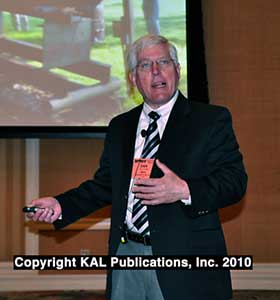The anti-oil agenda in Washington is so strong and so deep and driven by our legislative leaders who really want to dismantle the oil industry.
The Obama Administration has proposed a new rule that would bring 885 counties into non-attainment for ground level ozone levels. This would require reformulated gasoline in 885 new counties.

Congress wants to reduce gasoline and diesel consumption 20% between now and 2020. Let me translate that to marketers. Gasoline consumption reached the lowest point between now and October 2008 yesterday. And they want to take 20% off that.
Congress played their hand last year when it comes to carbon emissions restrictions. But coal doesn't have to meet carbon restrictions for 10 years. Natural gas got more exceptions than they need. The whole agenda of global warming is being balanced on the back of gasoline and diesel customers.
If Congress does nothing, we're still going to have significant drops in carbon emissions. The carbon emissions come from coal and natural gas. But the coal and natural gas industries have more clout in Washington D.C., so they're putting the reductions on the petroleum industry and leaving coal and natural gas alone.
Washington doesn't think of rural people. Washington has big city notions. They don't think of people who need their cars to get to work or get to the doctor. They can't catch a bus or a streetcar or walk to get there. But that's the party line.
If we get cap and trade, we're going to $5.00 per gallon of gasoline.
Renewable energy consumption is the future. But right now 40% comes from petroleum, 23% is natural gas, 8% from nuclear, 22% from coal, and 7% from renewable energy. Of that 7%, 3.5% comes from biomass and that means ethanol and biodiesel. Even if they double the amount of ethanol and biomass production, that's only 7% of the total. Saying we're going to replace gasoline with ethanol isn't real. It's a pipe dream. It's an illusion. But that's what we're dealing with in Washington, D.C.
Credit card interchange fees have been a big issue for us in Washington. I predict that our best shot for getting this passed is next spring after the midterm elections. I think we have the votes to get it passed. But, of course, the banks are fighting back.
The Chairman of the House Transportation Committee believes every transport truck should have a wet line purging system. It will sense if there is fuel in the line and use air to force the fuel back into the tank. We've been negotiating this and this is where we are now on this: all new gasoline transports will have one starting 2 years from now and every truck will have one by 2025. Theoretically you would never have to retrofit a truck. They cost about $3,000 to $4,000 per truck to put on plus there are maintenance costs. We're going to fight it in the Senate. We can't fight it in the House. The Chairman of the House Transportation Committee is too powerful. He can say, 'Don't you want a bridge in your town?'
Retailers have an adversity to prosperity. Every time they have reduced costs, they pass it on to the consumers. Retailers always, always give up margin. Do credit card companies always give up margin? No way.
Trade magazine publishing featuring a “hometown paper” approach to industry news, events, and the people who make it all happen.